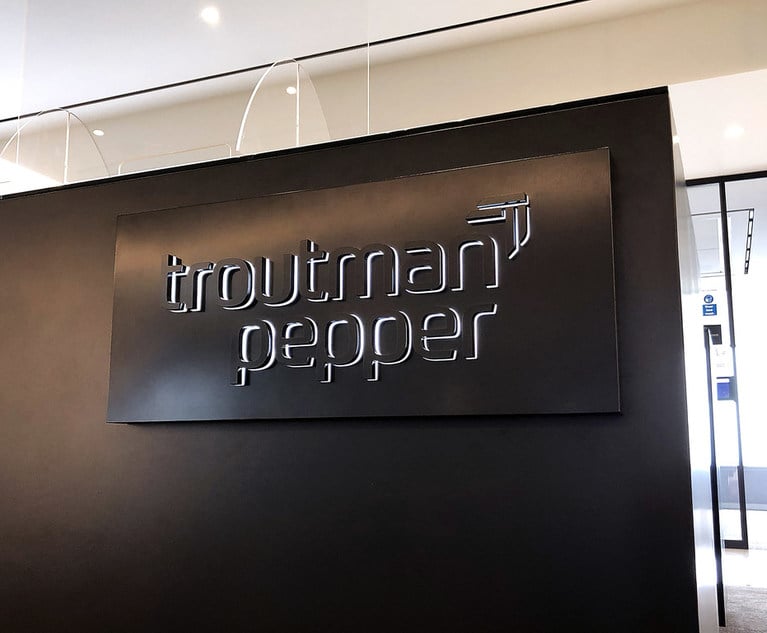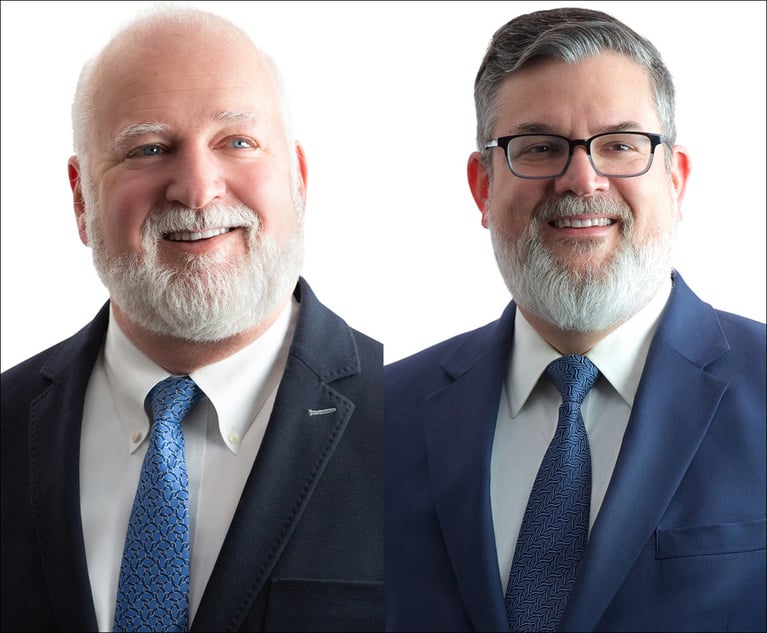Law Firms See Promise—and Peril—in Multibillion-Dollar Vaping Market
The booming vape and e-cigarette industry could mean big legal business—or it could go up in smoke.
August 05, 2019 at 04:46 PM
10 minute read
 (Photo: Shutterstock.com)
(Photo: Shutterstock.com)
Vaping and e-cigarettes have exploded into a $5 billion industry in the last decade, sparking interest by some corporate law firms in developing industry-focused practices. But a new U.S. Food and Drug Administration deadline that gives vape product manufacturers only 10 months to seek market approval could mean much of the industry goes up in smoke.
Meanwhile, teenagers’ embrace of the JUUL e-cigarette, introduced in 2015, has sparked a backlash against vaping, initially marketed to adult smokers as a less harmful substitute for cigarettes.
“My practice might be coming to an end before I’d like,” said Azim Chowdhury, a partner at Keller and Heckman in Washington, D.C., who is one of the few lawyers in the nation with a dedicated vape law practice, advising distributors and manufacturers on regulatory and compliance issues.
A federal judge on July 11 pushed up a 2022 deadline to May 11, 2020, for vape manufacturers to submit a premarket tobacco application to the FDA for product approval. E-cigarette and vape products that fail to win FDA approval will be barred from the market.
Chowdhury said the shortened deadline could be an insurmountable hurdle for many small companies, including his clients, that make up the bulk of the vaping industry.
Combined with the federal regulatory uncertainty, local governments are clamping down on vaping. San Francisco in June became the first major U.S. city to ban e-cigarette sales, right after Massachusetts in May sued a national vape retailer, Eonsmoke, alleging it targeted minors for its product.
 Eric Heyer
Eric Heyer“It’s do-or-die over the next year or so over the viability of this product category—and what products have a long-term future,” said another vape lawyer, Thompson Hine partner Eric Heyer, in Washington.
What’s more, a growing number of plaintiffs firms are filing suits against JUUL Labs, which is partly owned by tobacco giant Altria, claiming its e-cigarette has harmed their teenage clients’ health.
“The JUUL phenomenon has kind of usurped the industry and the conversation with the youth issue,” Chowdhury said.
Future Legal Business
But the enormous amount of regulatory uncertainty for the growing vaping industry could mean business for corporate firms. There are also intellectual property disputes, import and trade issues and the recent spike in tort litigation—first over burns from exploding lithium batteries in some e-cigarette models and now, with the JUUL backlash, for hooking kids on nicotine.
 Bob Alpert
Bob AlpertMorris, Manning & Martin partner Bob Alpert started an e-cigarette/vape practice for the Atlanta-based firm after one client, a Chinese e-cigarette distributor, asked him to defend a claim alleging an exploding lithium battery in an e-cigarette caused burns for the user. He currently has active matters in at least eight states.
While there are a few big vape companies, like JUUL Labs, Alpert said, most are smaller to midsize companies without large legal departments, so his relationships with vape companies have led to additional work for the firm, advising on minimizing risk as well as corporate and IP matters.
Morris Manning is investing in the practice. Alpert and several other Morris Manning lawyers in April held a seminar in Shenzhen, China, where most vape devices are manufactured for e-cigarette makers on doing business in the United States.
On the plaintiffs side, an increasing number of law firms are targeting JUUL Labs over teenage vaping.
After suing big tobacco companies for 25 years, South Florida plaintiffs lawyer Scott Schlesinger filed a federal class action against JUUL Labs, Altria Group and its subsidiary Philip Morris USA in mid-April, alleging they have taken tactics out of the Big Tobacco playbook to hook kids on smoking.
Altria bought a 35% interest in JUUL Labs in December for $12.8 billion, and anti-smoking activists like Schlesinger say the tobacco giant’s aim is to use the JUUL e-cigarette to cultivate a new market of teenage smokers. Critics say JUUL, which has sucked up more than half the e-cigarette market, is enticing to teens because of its fruit-flavored eliquids and youth-oriented social media marketing.
On July 24, Schlesinger filed a preliminary injunction against JUUL Labs to stop the sale and marketing of its products until the company obtains premarket authorization from the FDA.
“Somebody’s got to do something,” Schlesinger said in an interview. “It shouldn’t be on the market.”
While cigarette smoking for adults declined from 21% in 2005 to 14% by 2017, teenage vape use has increased, according to the Centers for Disease Control. According to the CDC’s National Youth Tobacco Survey, 20.8% of high school students surveyed last year said they’d used an e-cigarette in the past month—up from 11.7% in 2017.
That prompted the U.S. Surgeon General last December to call teen e-cigarette use a “public health epidemic.”
Schlesinger’s lead plaintiff is a 15-year-old girl, A.N., whom the complaint says is addicted to JUUL and suffers from nicotine-induced seizures. A.N. began “JUULing” at 14, attracted to the mango flavor and unaware that JUUL contained nicotine.
JUUL Labs has engaged Gibson, Dunn & Crutcher and Gunster, Yoakley & Stewart, while Altria and Philip Morris USA have retained Arnold & Porter Kaye Scholer and Burr & Forman for their defense.
Schlesinger, who calls himself a smoking abolitionist, said that when he first heard about vaping a few years ago, he thought it could be a reduced-harm alternative to cigarettes. He even bought one of the devices for a friend with a four-pack-a-day cigarette habit.
But he said the popularity of JUUL with young teens changed his views, adding that research shows 99% of smokers are hooked on nicotine by age 21. JUUL Labs is “making a nicotine-perpetuation-addiction product,” not a smoking-cessation product, Schlesinger said, “and it starts with adolescents.”
JUUL Labs hasn’t yet answered Schlesinger’s complaint, but its CEO, Kevin Burns, has said JUUL is not intended for underage smokers.
Schlesinger and other plaintiffs lawyers are separately suing JUUL Labs in multiple states, and national plaintiffs firms have gotten involved. A September CLE on suing JUUL Labs and other e-cigarette-makers over health risks has attracted speakers from high-profile firms such as Beasley Allen, Morgan & Morgan, Lieff Cabraser Heimann & Bernstein and Motley Rice.
FDA Intervenes
Chowdhury and Heyer, both 38, started representing the small startups making up the vape industry a decade ago, when e-cigarettes were just being imported to the United States from China and the emerging industry was still unregulated.
Then a young associate, Chowdhury wrote a paper around 2010 on how the FDA might regulate vape products for the Food & Drug Law Institute’s magazine, The Update.
“We focus on compliance,” Chowdhury said of the practice he’s built at Keller and Heckman. “And we represent the smaller companies—not the big-tobacco-affiliated companies.” Most have revenue between $1 million to $30 million, he said.
Also about a decade back, Heyer was an associate on a Thompson Hine litigation team that successfully represented an e-cigarette distributor, Smoking Everywhere, in a federal suit against the FDA. The agency in 2008 had blocked its products’ entry from China as an unapproved drug-device. That opened the door to an e-cigarette industry in the United States, he said.
“I saw it as a novel product category with real potential and positive ramifications for public health,” Heyer said. “We can have people who are multi-pack-a-day cigarette users transition to these products.”
It was not until 2009 that FDA gained regulatory authority over vaping products, when the Tobacco Control Act became law and classified them as tobacco products. But the FDA did not take steps to regulate vape-makers until 2016, when it promulgated a Deeming Rule saying e-cigarettes and other vaping devices would be subject to premarket approval, as for new drugs and food products.
Chowdhury and Heyer said that supercharged their practices, as vape companies sought them out for compliance advice. “The need for legal services really peaked from then,” Heyer said.
From Below Radar to Backlash
If vape device and e-liquid makers survive the FDA approval process, then vaping law, still a niche practice, has the potential to expand exponentially—or the entire industry could shut down.
The FDA initially set a 2021 deadline for vape manufacturers to submit a premarket tobacco application—later extended to 2022. The shortened May 2020 deadline will be hard for their clients to meet, said Chowdhury and Heyer, because the approval process requires time-consuming and expensive lab and human subject testing.
The FDA has said it could cost from $117,000 to $466,000 per product, which the vape lawyers consider a conservative estimate.
Chowdhury and Heyer emphasized that the vape companies they represent do not oppose obtaining FDA approval—and believe vaping products should be kept from those under 18, the legal federal age to buy tobacco products.
If a company can’t meet the FDA’s 10-month deadline, it’s not clear what happens next. “We’re in the process of trying to figure that out,” Chowdhury said. “Most of the industry may not be able to meet this deadline.”
Penalties range from an FDA warning letter to criminal prosecution, Heyer said.
Meanwhile, prompted by the teen-vaping backlash, other cities and states are considering following San Francisco’s lead and banning all vaping products.
“San Francisco has just banned e-cigarettes—but you can still buy a pack of regular cigarettes at any convenience store,” Chowdhury said. “So now a whole class of people does not have access to these reduced-harm products.”
Ironically, he said, cigarettes are not subject to the FDA’s new premarket approval requirement because the Tobacco Control Act grandfathered in any tobacco product on the market before Feb. 15, 2007. “The FDA should regulate based on what causes the most harm—and combustible cigarettes are the most harmful,” Chowdhury said.
In one possible indicator of the industry’s future, the FDA in April approved Philip Morris International’s premarket tobacco application to market iQUOS, a next-generation device that vaporizes tobacco from real Marlboro cigarettes instead of burning it.
To Schlesinger, the plaintiffs lawyer, that bodes ill for nicotine abolishment, because it suggests that the FDA will approve other vape devices, including JUUL. If they’re approved, he added, the FDA should require a prescription to keep them away from children.
“The only constant in this industry,” Heyer said, “is change and uncertainty.”
This content has been archived. It is available through our partners, LexisNexis® and Bloomberg Law.
To view this content, please continue to their sites.
Not a Lexis Subscriber?
Subscribe Now
Not a Bloomberg Law Subscriber?
Subscribe Now
NOT FOR REPRINT
© 2025 ALM Global, LLC, All Rights Reserved. Request academic re-use from www.copyright.com. All other uses, submit a request to [email protected]. For more information visit Asset & Logo Licensing.
You Might Like
View All
28 Firms Supporting Retired Barnes & Thornburg Litigator in Georgia Supreme Court Malpractice Case
7 minute read
Troutman Pepper Says Ex-Associate Who Alleged Racial Discrimination Lost Job Because of Failure to Improve
6 minute read

Law Firms Expand Scope of Immigration Expertise Amid Blitz of Trump Orders
6 minute readTrending Stories
- 1Public Notices/Calendars
- 2Wednesday Newspaper
- 3Decision of the Day: Qui Tam Relators Do Not Plausibly Claim Firm Avoided Tax Obligations Through Visa Applications, Circuit Finds
- 4Judicial Ethics Opinion 24-116
- 5Big Law Firms Sheppard Mullin, Morgan Lewis and Baker Botts Add Partners in Houston
Who Got The Work
J. Brugh Lower of Gibbons has entered an appearance for industrial equipment supplier Devco Corporation in a pending trademark infringement lawsuit. The suit, accusing the defendant of selling knock-off Graco products, was filed Dec. 18 in New Jersey District Court by Rivkin Radler on behalf of Graco Inc. and Graco Minnesota. The case, assigned to U.S. District Judge Zahid N. Quraishi, is 3:24-cv-11294, Graco Inc. et al v. Devco Corporation.
Who Got The Work
Rebecca Maller-Stein and Kent A. Yalowitz of Arnold & Porter Kaye Scholer have entered their appearances for Hanaco Venture Capital and its executives, Lior Prosor and David Frankel, in a pending securities lawsuit. The action, filed on Dec. 24 in New York Southern District Court by Zell, Aron & Co. on behalf of Goldeneye Advisors, accuses the defendants of negligently and fraudulently managing the plaintiff's $1 million investment. The case, assigned to U.S. District Judge Vernon S. Broderick, is 1:24-cv-09918, Goldeneye Advisors, LLC v. Hanaco Venture Capital, Ltd. et al.
Who Got The Work
Attorneys from A&O Shearman has stepped in as defense counsel for Toronto-Dominion Bank and other defendants in a pending securities class action. The suit, filed Dec. 11 in New York Southern District Court by Bleichmar Fonti & Auld, accuses the defendants of concealing the bank's 'pervasive' deficiencies in regards to its compliance with the Bank Secrecy Act and the quality of its anti-money laundering controls. The case, assigned to U.S. District Judge Arun Subramanian, is 1:24-cv-09445, Gonzalez v. The Toronto-Dominion Bank et al.
Who Got The Work
Crown Castle International, a Pennsylvania company providing shared communications infrastructure, has turned to Luke D. Wolf of Gordon Rees Scully Mansukhani to fend off a pending breach-of-contract lawsuit. The court action, filed Nov. 25 in Michigan Eastern District Court by Hooper Hathaway PC on behalf of The Town Residences LLC, accuses Crown Castle of failing to transfer approximately $30,000 in utility payments from T-Mobile in breach of a roof-top lease and assignment agreement. The case, assigned to U.S. District Judge Susan K. Declercq, is 2:24-cv-13131, The Town Residences LLC v. T-Mobile US, Inc. et al.
Who Got The Work
Wilfred P. Coronato and Daniel M. Schwartz of McCarter & English have stepped in as defense counsel to Electrolux Home Products Inc. in a pending product liability lawsuit. The court action, filed Nov. 26 in New York Eastern District Court by Poulos Lopiccolo PC and Nagel Rice LLP on behalf of David Stern, alleges that the defendant's refrigerators’ drawers and shelving repeatedly break and fall apart within months after purchase. The case, assigned to U.S. District Judge Joan M. Azrack, is 2:24-cv-08204, Stern v. Electrolux Home Products, Inc.
Featured Firms
Law Offices of Gary Martin Hays & Associates, P.C.
(470) 294-1674
Law Offices of Mark E. Salomone
(857) 444-6468
Smith & Hassler
(713) 739-1250






